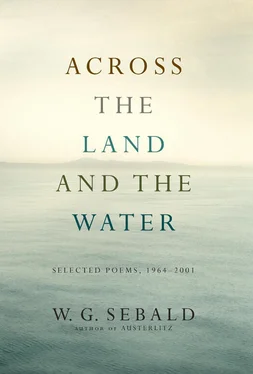W. G. Sebald’s poems present the translator with a number of quandaries, at least one of which does not derive from disparities between the English and the German languages, or directly from the poet’s wide-ranging allusiveness. The problem I am referring to arises because the translation — in bodying forth a poem that claims to address exactly the same subject that the poem does in German, and even to represent the author’s language — has no choice but to turn itself into a vehicle of the very difficulties that may have prompted Sebald’s poem in the first place. This is most evident in relation to two of the poet’s perennial and interrelated concerns: reading and memory. Many of Sebald’s poems, for example, address elisions, or repression and suppression of memory, texts, and other forms of discourse. However sincerely motivated, however close to the source, the translation of a poem “perpetrates” just such elision. For in order to offer the best possible guidance to a text in the course of its transformation in the new hermeneutic environment, the translator must change not merely a few items but every single word of the poem. Even names — Kunigunde, Badenweiler, Landsberg, Hindenburg — have a different sound, with different connotations, and are likely to be read from a different perspective in the target language.
Entry to a new cultural context transfigures the poem and evidently regenerates its testimony. It may be argued, however, that this difficulty merely leads to a frequently visited aporia — that logical cul-de-sac whose sole outcome is to posit the impossibility of translation — and that by redefining the boundaries of the problem we can liberate the translator from the cavil of misrepresentation. For does not the poem itself — which the translation, by some sleight of hand, actually pretends to be, and whose movement it purports to reenact — construct perspectives from which it will be read, opening certain routes to the understanding of its world and, consequently, eliding others? The translation, inventing the original word by word (for without a translation there is no original), follows the “hard act” of the poem, rebuilding its place in a new terrain. In so doing, it harbors the hope that as many new readings of the poem will be added as those which, inevitably, have been lost. For in the end, the survival and continuing promise of the poem depend on just such access to new and engaging environments of intellectual sophistication and skillful acts of reading.
“Reading” in Sebald’s poetry, however, is a process that not only responds to text. His poems read paintings, towns, buildings, landscapes, dreams, and historical figures. The result is an encyclopedic wealth of literary allusion and cultural reference, much of which may not be named in the text itself. Sebald’s sentences can not only contain pitfalls but thread an uncomfortably narrow ledge along the abyss of what, in one poem, he calls “the history / of torture à travers les âges” (“Bleston”). The difficulties this creates for the translator are self-evident. Words are by nature as precise as they are ambiguous, and the translator must in each case explore the field of reference, resonance, and determination in the source text and language before deciding on one word rather than another. With Sebald’s poems, such explorations can prove long and complex, leading the explorer to a plethora of attendant historical and cultural “dark matter,” in relation to which the poem itself may appear deceptively straightforward and even slight. Sometimes this dark matter — however aware the translator needs to be of its existence — does not, in the end, affect the words of a translation in any pivotal way.
Allow me to offer an example that will take us into the heart of the difficulty of translating Sebald’s poetry. Many of the poems in this volume — which opens with a train journey — reenact travel “across” various kinds of land and water (even if the latter is only the fluid of dreams). Indeed, several, as the writer’s archive reveals, were actually written “on the road,” penned on hotel stationery, menus, the backs of theatre programs, in cities that Sebald visited. Train journeys constitute the most frequently recorded mode of travel. The following poem may refer to one such journey. “Irgendwo,” translated in English as “Somewhere,” was probably written in the late 1990s and originally belonged to the sequence of “micropoems” that provided the material for Sebald’s posthumous collection Unerzählt ( Unrecounted ), published in 2003:
Somewhere
behind Türkenfeld
a spruce nursery
a pond in the
moor on which
the March ice
is slowly melting
With its evocation of a wintry landscape and the suggestion that a thaw is on its way, this apparently simple poem seems nothing short of idyllic. The invitation to research possible frames of reference is expressed solely by the place name Türkenfeld: a small town — indeed, hardly more than a village — in the Fürstenfeldbruck area of Upper Bavaria, on the so-called Allgäu line, a route that Sebald would have taken often enough between Sonthofen and Munich. However, it is well for a translator to be aware that landscapes in Sebald’s work are rarely as innocent as they seem. The phrase “behind Türkenfeld” is itself already an indication of “how hard it is”—in the words of what could almost be read as a programmatic poem opening the present collection—“to understand the landscape / as you pass in a train / from here to there / and mutely it / watches you vanish.” In this metaphorical sense, the poem puts the traveler’s gaze itself at the center of its encounter with a cryptic landscape, exploring the difficulty of inciting a historical topography to return that gaze by divulging its secrets. Many of Sebald’s poems enact the battle of the intellect and senses with the hermetic or repellent face of history’s surface layers. The impression is one of traveling across a land in which the catastrophic events of the twentieth century have left a pattern of shallow graves under the almost pathologically hygienic and tidy upper stratum of civilization. What, then, is “behind” Türkenfeld?
The only thing this “mute” landscape divulges to the traveler-reader is its name, a sign linking the idyll of the poem to the “dark matter” of its cultural-historical ambience. The poem shows us only the unsettled gaze. To the close reader of landscapes, however, the name itself is enough to admit the “cold draught” (the title of another poem more visibly “freighted” than this one) of a relatively recent yet already almost forgotten history into the space of the poem. Research tells us that one of the ninety-four sub-camps linked to Dachau was constructed in Türkenfeld, though it was never used. The surrounding landscape is the site of the eleven external camps of the Kaufering network of satellite camps. These were set up to facilitate arms manufacture in underground caverns and caves in an effort to evade Allied bombing, the geological composition of the Landsberg area proving favorable to construction of massive underground installations. Türkenfeld was formerly a station on the Allgäubahn, and the railway linking Dachau with Kaufering and Landsberg, known as the Blutbahn (“the blood track”), passed through Türkenfeld. As many as 28,838 Jewish prisoners were transported along this line from Auschwitz and Dachau to Kaufering to work as slaves on the construction of the underground aircraft plants Diana II and Walnuß II. Some 14,500 died in the plant or were transported, when they had become too weak to work, back through Türkenfeld to the gas chambers. Our first unknowing reading of the poem, and with it the poem’s own translation of an unruffled, apparently unremarkable landscape “mutely” watching us “vanish,” points to the perilous consequences of our loss of cultural memory. “To perceive the aura of an object we look at,” wrote Walter Benjamin, referring more to the work of art than to landscapes, “means to invest it with the ability to look at us in return.” Our struggle to “understand” the mute historical holdings of Sebald’s poetic landscapes in passing — a form of engagement that his poems frequently invite the reader to explore — brings us face to face with our failure to make the crucial investment that Benjamin describes.
Читать дальше












